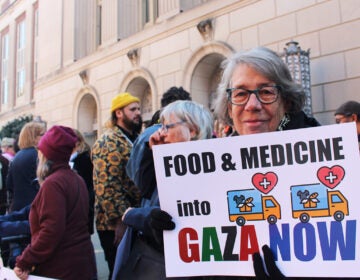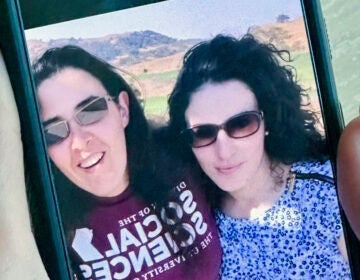Philadelphia-area residents with ties to Iran and Israel react to conflict with hopes and fears
While Iranian residents worry about how the Islamic Republic of Iran will act with brutality to its own citizens as a result of the conflict, Israelis hope for regime change.

File - More than a dozen organizations organized a rally against U.S. involvement in the Israel-Iran war in Philadelphia on Saturday, June 21, 2025. (Emily Neil/WHYY)
From Philly and the Pa. suburbs to South Jersey and Delaware, what would you like WHYY News to cover? Let us know!
Philadelphians with ties to Iran and Israel remain wary and hopeful as the ceasefire that put a pause on the 12-day war continues. The conflict began with Israeli strikes against Iran on June 13. The Iranian Health Ministry said 627 Iranians were killed, while 28 people in Israel perished, according to Israeli officials. The U.S. entered the fray by bombing Iranian nuclear sites on June 21. Iran responded by sending missiles to attack a U.S. airbase in Qatar, most of which were intercepted and caused no casualties.
Iran’s Supreme Leader Ayatollah Ali Khamenei spoke Thursday after days of silence, saying the country’s response to the U.S. bombing was a “slap to America’s face.”
A protest against U.S. involvement in the conflict is planned for Saturday as organizers say they expect “hundreds” of people to rally at City Hall in Center City Philadelphia.
Philadelphia residents of Iranian descent fear impact of conflict on average citizens and prisoners back home
Sanaz Yaghmai, a Dubai-born resident of Iranian descent and president of the organization Philly Iranians, wiped away tears as she reflected on her initial reaction to hearing about the Israeli strikes in Tehran earlier this month.
“My dad, he lives in Dubai, but he also visits Iran a lot,” Yaghmai said. “He was in Tehran at that time, because he travels around, and so it was obviously deeply shocking and completely unexpected.”
Despite the ceasefire in place, Yaghmai said she’s not hopeful, because she doesn’t trust either of the governments involved.
“It just seems like there is enemies all around and the Iranian people’s number-one enemy has always been the Islamic Republic,” Yaghmai said.
Yaghmai said she worries that the Islamic regime has intensified its brutality and stepped up executions of political prisoners.
However, she said she does have faith “in the people of Iran.”
“The Iranian people continue to remain resilient and hold each other through their grief, their rage, and then probably extreme exhaustion at this point,” Yaghmai said.
Hosein Maleki, an Iranian-born Philadelphia resident who teaches at Rutgers University, has similar views about the Iranian government, and welcomed the initial targeted Israeli assassinations.
“To be honest, I got quite happy when I saw generals are being targeted,” Maleki said. “But after that, I started getting worried about how precise they’re going to hit those targets — is it going be a long war?”
Maleki grew up in the southern Iranian city of Ahvaz during the Iran-Iraq war.
“I still remember the war,” Maleki said. “I have clear memories of the bombardments and the whole panic and the need to evacuate the cities.”
Maleki shares Yaghmai’s fears about the Islamic regime.
“The regime doesn’t have a good history of respecting human rights or due process,” Maleki said. “So my big fear is that executions are going to continue.”
Philadelphians with ties to Israel hope for regime change in Iran
Philadelphia-area Israeli residents also worry about the conflict’s impact on friends and family back home.
“I see my family going to the bunker all the time, to the shelters,” said Amir Shoham, an Israeli-born professor at Temple University’s Fox School of Business. “I’m always afraid something will happen to my parents, to my sister, to my extended family, to my friends. It becomes very personal.”
Shoham said “Israel did what it had to do,” because he said the Islamic Republic of Iran has claimed it would destroy Israel and “kill Jews,” he said.
“This was a, I think, a big victory and hopefully it would change the Middle East for the better because most Israelis just want to live in peace,” Shoham said.
He said that if the Islamic regime is removed, there is hope that Israel and Iran can rekindle a diplomatic relationship that Shoham said once existed.
“We were good friends, you had daily flights from Tehran to Tel Aviv,” Shoham said. “There were very good relations up to the Islamic Revolution. I hope they will topple the Islamic regime, that would be the optimal outcome.”
Jason Holtzman, who heads community relations at the Jewish Federation of Greater Philadelphia, agreed, saying “hope is a Jewish value,” but that in order to achieve peace, the Islamic regime “will need to go.”
“Seeing what’s happened over the past two weeks, as well as the United States getting involved in really hitting those nuclear facilities, setting them back years, I do believe that there’s hope,” Holtzman said.
The effectiveness of the U.S. strikes on Iranian nuclear facilities remains unclear as President Donald Trump initially described the attack as an “obliteration,” while an intelligence report said the attack set back the nuclear capabilities by a few months.

Get daily updates from WHYY News!
WHYY is your source for fact-based, in-depth journalism and information. As a nonprofit organization, we rely on financial support from readers like you. Please give today.




